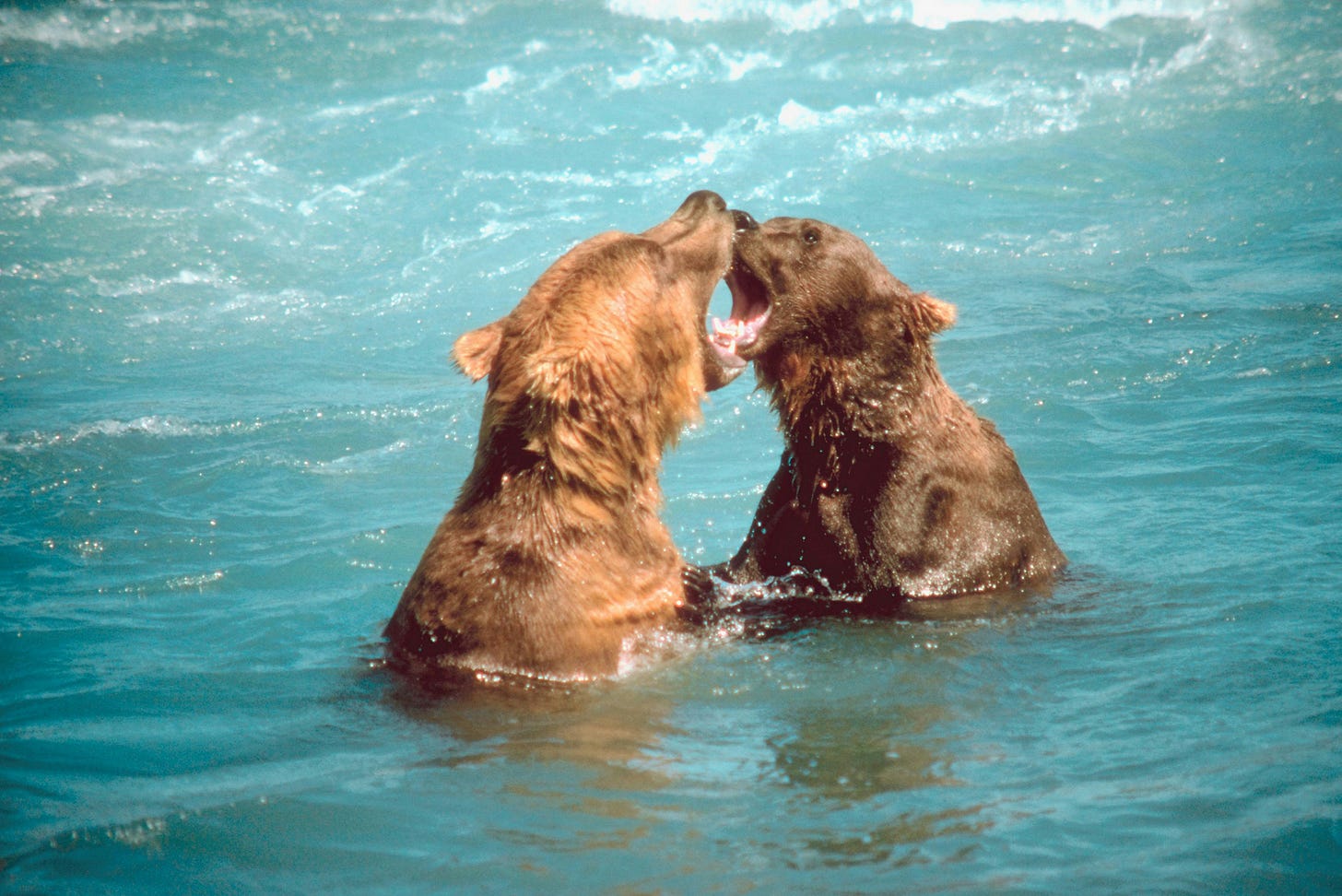The Nature of Human Conflict

Conflict is an inevitable facet of human existence, a product of evolutionary design that has imparted consciousness, conscientiousness and emotion in all people. To be alive is to know joyousness and anger, serenity and madness, rationality and frenetic obsession, all of which contribute to an ever-developing drive to seek solutions for interpersonal tensions. Naturally, we tend to avoid discord as it generally brings forth a level of discomfort, especially while active; however, in creating a sustainable and realistic framework for conflict-resolution, we ensure that the essence of peace is instilled in all future relational endeavors. This is applicable to home-life, romantic connections, professional environments and elsewhere as disharmony creeps into all aspects of living, indiscriminately. Left unresolved, it corrodes the fundamental architecture of civilized humanity—it is insidious, an acidic tormenter that feeds off division and multiplies with volatility while kept away from scrutiny.
There are many factors that facilitate the conversion of minor disagreements into full-fledged, disarrayed conflict. For example, an underlying sense of arrogant pride leads people to stick with their convictions, regardless of contradictory evidence or apparent detriment resulting from their stubborn positionality. Distortions in perception stemming from inherent biases or judgements towards others may cause exaggerated reactions or accusations, warping situational interpretations and infusing an atmosphere of instability, analogous to a room filled with explosive gas waiting for the strike of a match. Deep-rooted anger and resentment is plausibly the most substantial reason for escalated disputes, contempt seeded by childhood trauma or abandonment that went unseen for years before being triggered into action by a seemingly trivial matter, projected onto an undeserving bystander simply due to misfortune of circumstantial placement.
Conflict can typically be broken down into a simplistic array of differences between parties; variations in moral structure, values, belief systems, lived experience, family of origin, mental or physical health, and formalized education may all characterize mounting-issues within organizations and relationships. Individuals are complex and multilayered organisms, compiled of distinctive memories and feelings comprised into unique, flawed yet perfect beings. One’s external operation does not always equate to a representative depiction of their inner landscape; thus, it is crucial to hold and convey a strong element of compassion during all mediations of conflict. I can attest to an inner struggle invisible to my outward-world, a debilitating pain of reality that drove absurd and destructive behavior in an effort to soothe a chaotic psychic geography, a poor reflection of my true, actualized self.

Forging strategies to cope with a diverse range of conflict-types is paramount in maintaining adequate mental wellness throughout one’s lifespan. If not dealt with, conflict has the power to drastically reduce quality of living, causing an accumulation of stress, broken communication, dissatisfaction, malaise, and even existential dangers to the whole group or population. Without proper resolution, conflict would rapidly overwhelm society, fostering systemic-dissolution, mass hatred and violence, lawlessness and disorder, a spiraling descent into insanity. How we deal with interpersonal issues depends on the severity and nature of the dilemma. Problem solving techniques include: utilization of analogous problem solutions, mechanistic modelling, simplification, testing a multitude of potential hypotheses, reductionism or transfiguration of the problem, root-cause evaluation, and generic brainstorming. Mediation from an impartial third-party is a common approach to organizational disputes as it generates a felt-sense of fairness, respect and diligence. Clearly derived policy on conflict-resolution procedure is another tactic used in hierarchies, providing a dependable container that outlines exactly how to navigate the sometimes murky waters of discord.
In my experience, an outer presentation of aggression, confusion or agitation usually corresponds to some dysfunctional adaptation that has evolved within me. An acute awareness of internal workings is a critical piece of the overall conflict-resolution framework, as it allows for direct mending of a delicately-oriented wound, an unexplored component of my psychological makeup that presents itself in my surroundings as incongruency. In addiction, I would occasionally lash out at others, subconsciously attempting to compensate for past wrongdoings afflicted upon me, harming innocent witnesses who unwillingly found themselves along my path of havoc. The usage of drugs and alcohol is an accelerant in exposing damaged, dangerous parts of self, buried limbs that were never meant to interact with others, artifacts of past trauma, abuse, self-harm and neglect. To fully revive and rejuvenate these historic relics is a healthy goal of self-realization; however, to release them unto involuntary strangers via psychoactive disinhibition is immoral and wrong, a lesson I have thankfully learned and retained in my nearly 9-months of continuous sobriety.
Although conflict is not easy, it is often a rewarding and richly instructing teacher, especially when conducted with thorough preparedness and precise rationality. It is an inescapable ingredient of mortal life; therefore, it must be given important consideration in all areas of obligated responsibility. Conflict can be entirely constructive under correctly guided deployment—it may serve to tighten connections, harmonize teams and strengthen individuality under carefully devised conditions. To defuse conflict of any creation is a dynamic tool of utmost power, one that can enhance society and strengthen the survivability of the human race.

The above essay was originally completed as a requirement for Alberta’s Alternative Measures Program, a system designed to grant second-chances at life to first-time criminal offenders—such as myself. In the deepest-throws of my late-stage addictive trajectory, I was handed charges of assault on a security guard and resisting arrest, a disturbing moment whose aftermath haunted me well into my now solidified recovery. There is a great deal of critical nuance underlying the foundation of this event; regardless, the driving factor which led to my foray into the network of justice was my entirely unmanageable addictions to various substances, at that time particularly to cocaine and benzodiazepines. The manic insanity felt in coming down from a weeks-long cocaine bender was unbearable, and thus I would do anything to obtain my next fix; for example, wading drunkenly across a fast-moving river in the dark of night, a means of circumventing a long walk which would have impaired the timing of meeting my then-dealer.
The root-cause of my incrimination that night was an abhorrent effort to absolve an intricate conflict with parties of authority, an issue I have faced in similarity since my mid-teenaged years that remains lurking beneath the surface of my settled psyche. I suppose it was poetically fitting that the finality of my addictions career was laced with defeat and humiliation at the hands of the law, something I had successfully evaded, at times barely, for years prior as I navigated the complicated realm of illicit drug acquisition and possession. My witnessed story of that fateful evening lies in contradiction to the inevitable charges; however, this historical remembrance ultimately does not matter, for I was the one intoxicated, a position of vastly-diminished power in such situations. My drug usage was the source of problematic manifestation and although this is not a moral inadequacy on my behalf, I am definitively responsible for the garnered outcomes. This is simply how it is, an uncomfortable truth I have come to radically accept.
This experience has served as a valuable teacher, not only regarding the gravity of unconstrained addictive behavior and the structure of our legal framework, but on the functionality of privilege in wealth and race. I was fortunate enough to obtain a capable lawyer and thus the probability of me ever entering a jail cell over this ordeal shrank by orders of magnitude, a luxury many of my peers are not afforded. Despite the arresting officers being rough with me, I am yet alive, potentially owing at least partially to the color of my skin—were I a black man in a state of unpredictable psychoses, grappling with all my might from the clutches of multiple burly, armed detainers, my fate may not have been so blessed. I have been through paralleled incidents before, unfortunately; hopefully, I will never again test the waters of possible permanent incarceration, a frightful position for anyone to bear, riddled with uncertainty, guilt and despair, reputation and freedom hinging at the mercy of a complex and jaded bureaucracy.

Through this journey I have furthermore been inspired to investigate and ideally effect awareness around a controversial and convoluted social issue—the convicting and jailing of individuals for minor, two-sided offences they did not intend to commit. To be imprisoned for any length of time is a grave indictment that drastically alters the course of one’s future, impairing their livelihood, mobility and status through stigma and systemic barriers. Without meaning to abdicate responsibility for my own situation, I cannot integrally claim that I was truly in control during the night of my legal entanglement—I was deeply nested in a chasm of powerlessness, my actualized-self rescinded far into drug-supplied chaos, enduring wild scenarios of entrenched madness rolling past my unhinged periphery. My living essence was shifted into a dependence on stochastic outcome and engrained survival skills, automated non-ordinary actions predicated on a lifetime of persistence through hardship and oddity. Detached from standardized reality, I was involuntarily unconcerned with legality as I battled for my continued existence.
Theoretically, the justice system ought to differentiate between crimes undertook from a state of genuine volition and those resulting from a lack of cognizant perceptivity, assuming that the concept of free-will does indeed exist in plausible operation, which may not necessarily be accurate. It should also be wholly equitable, saturated by impartiality with respect to race, gender, orientation and status, situational, financial, educational or otherwise. I contemplate the efficacy of an adapted judicial system analogous to that utilized by many academic journals during the peer-review process—double-blinded connectivity between judge and subject, forcing those in power to work exclusively with facts pertinent to the case-at-hand, negating biases and conflicts that do nothing but diminish professionalism and enhance nonobjectivity. As it stands, the legal realm is an overtly elaborate structure that blatantly favors particular subsets of our population while acting relentlessly vindictive towards others.
Stemming purely from randomized circumstance, my personal subjugation at the hands of justice was rerouted after a solid duration of painful apprehension, straightforwardly removing my will from the typical stream of processing, providing a wonderous chance to actually learn and grow. This was a fair determination—my crime was serious but given its context, an eternal association with criminality would hardly be just. I now stand at the forefront of a new way of living, one etched in sobriety and unbridled from a heavy past, a meaningful state of being permeated with opportunity and potentiality. I have finally reached a place of authentic gratefulness, satisfied with what I have and who I am yet completely open to more, the flow of vitality infusing my every step as I further cultivate inner and outer prosperity. It is a beautiful aspect of my life, well-deserved after nearly 2 decades of intense suffering; easily, this futurized joy could have been ripped away had I been unable to employ a decent lawyer, an alarming consideration. Not everyone in such a situation can and for that I grieve, longing to assist with the incorporation of equal-rights into the edifice of legality.
Thanks for reading! If you enjoyed this, please consider sharing with a friend or subscribing if you have not.
If you want to support my work, feel free to donate via Ko-fi.




